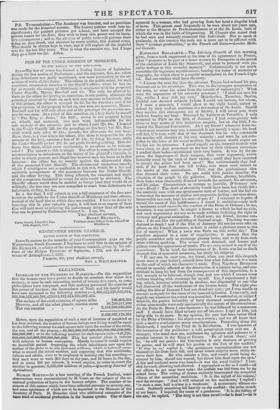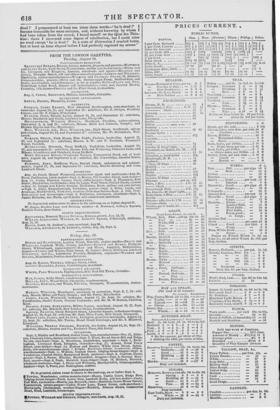GLEANINGS.
INCREASE OF TIIE NUMBERS OF Maxxissn.—On the supposition that the human race has a power to double its numbers four times in a century, or once in each succeeding period of twenty-five years, as some philosophers have computed, and that nothing prevented the exercise of this power of increase, the descendants of Noah and his family would have now increased to the following number ;-1,496,577,676,626,844, 588,240,573,268,701,473,812,127,674,924,007,424.
The surface of the earth contains, of square miles . 199,663,355 Mercury, and all the other planets, contain about 46,790,511,000 The sun contains . • . 2,442,900,000,000 2,489,887,174,355
Hence, upon the supposition of such a rate of increase of mankind as - has been assumed, the number of human beings now living would be equal to the following number for each square mile upon the surface of the earth, the sun and all the planets,-61,002,000,000,000,000,000,000,000,000, 000,000,000 ; or to the following number for each square inch-149,720, 000,000,000,000,000,000,000,000. This last number alone is infinite with relation to human conception. Merely to count it would require an incredible period. Supposing the whole inhabitants now upon the
surface of the globe to be one thousand millions, ic belinvprl
what to exceed the actual number, and supposing that this multitude, infants and adults, were to be employed in nothing else but counting,— that each were to work 365 days in the year, and 10 hours in the day, and to count 100 per minute, it would require, in order to count the number in question, 6,536,500 millions of years.—Quark4 Journal of Agriculture.
Huma's Honxs.—At a late meeting of the French. Institut, some observations were communicated by M. Cozes on the subject of the oc- casional production of horns in the human subject. The number of in- stances of this nature which have been collected amounts to seventy-one, and some specimens of which are to be deposited in the Museum of the Academy of Paris. III. Breschet cited two additional examples of the MAW kind of accidental production in the human species. One of these occurred in a woman, who bad growing from her head a singular kind of horn. This person used frequently to be seen about ten years ago, either at the Hospice de Perfectionnement or at the St. Lows, both of which she was in the habit of frequenting. M. Cloquet also stated that he had seen and minutely examined this individual. Not to speak it profanely, in this country the male sex is more apt to be afflicted with those "accident productions," as the French call them.—London Medi. Cal Gazette.
NAPOLEON BONAPARTE.— The Literary Gazette of this morning gives, from a work suppressed at the time of its appearance in France, what 4 4purports to be part of a letter written by Bonaparte at the period of the execution of Louis the Sixteenth, and must be perused with pe. culiar feelings at this eventful moment." Unfortunately it too much resembles the ingenious mystifications, bearing the name of memoirs or biography, for which there is a regular manufactory in the French Cassis tat. But our readers shall have the story.
" I learnt the next day that the advocate Target had refused his pro. fessional aid to his sovereign. This was, in the strongest acceptation of the term, to erase his name from the records of immortality ! What were the arguments of his cowardly prudence ? I shall not save his life, whilst I may risk my own.' Malesherbes, Tronchet, DesZze, faithful and devoted subjects (whom I could not imitate, but whom, if I were a monarchs, I would place at my right band), united to defend by their zealous exertions the descendant of St. Louis. Should they survive this courageous act of fidelity, I will never pass them without bareing my head. Detained by business at Versailles, I only returned to Paris on the 16th of January ; I had consequently lost three or four scenes of this ambitious tragedy, but on the 18th, I at. tended the National Convention. Als ! my friend ! whatever these re- volutionary maniacs may say, a monarch is not merely a man : his head will fall, it is true, with that of the shepherd, but be who commands the murder will shudder at his own temerity ; and were he not com- pelled by the force of his secret motives, the sentence would expire on his lips ere its utterance. I gazed eagerly on the intrepid mortals who were about to dare pronounce on the fate of their virtuous sovereign. I studied their looks—scrutinized their very hearts. It was by the ex- cesss, the importance of their trespass, they were supported, whilst inwardly awed by the rank of their victim : could they have ventured to retract the prince had been saved ! But unfortunately they had said, if his head does not fall to-day, ours must soon submit to the stroke of the executioner. This was the predominant idea that dictated their votes. No pen could with justice describe the situation of the people in the galleries. Silent, gloomy, breathless, their looks were alternately directed towards the accused, his advocates, and his judge. Circumstance as strange as horrible, D Orleans' vote was—Death ! The shock of electricity would have been less visibly felt : the assembly rose with one spontaneous start of horror, and the hall re- verberated the murmur of similar and responsive feeling : one man alone, immoveable as a rock, kept his seat—it was I! I ventured to inquire of myself the cause of this indifference ; I found it ambition—only such a sentiment could reconcile the conduct of the Duke of Orleans ; to me, therefore, it was natural: he sought a throne to which he had no title, and such acquisitions are not to be made without forfeiting the right to virtuous and general estimation. I shall now, my friend, become con. cise : I do not like the unfolding of funereal crape. The king was con- demned to death ! and if the 21st of January did not for ever affix an odium on the French character, at least it added a glorious name to the list of martyrs ! What a town was Paris on this awful day ! The populace appeared in a state of stupefaction : it seemed that the people assembled only to exchange gloomy looks, and to fly from each other without speaking. The streets were deserted, and houses and palaces wore the appearance of tombs. The air even seemed to smell of the executioner. To be brief, the descendant of St. Louis was led to death through files of mournful automata, but lately his subjects.
" If any one be near you, my friend, when you read this despatch (even were it your father), conceal from him what follows—it is a staiit on the stuff of which my character is made. That Napoleon Bonaparte should be sensibly affected at the destruction of a human being, and con- strained to keep his bed from the consequences of this impression, is a fact scarcely to be believed, though true, and one which I cannot avow without blushing with contempt for myself. Yes, I experienced a feel- ing, which, however admirable in another, was disgraceful to one who had disavowed all the weaknesses of the human heart. The night pre. ceding the 21st of January I had not closed my eyes; yet I was unable to account to myself for the cause of my unusual agitation. I rose early, and eagerly ran wherever the crowd was assembled. I wondered at, or rather I despised, the passive imbecility of forty thousand national guards, of whom nine-tenths were only mechanically the agents of the executioner. At the Porte St. Denis I met Santerre : he was followed bra numerous staff. I should have liked to have cut off his ears : I spit at him, not . being able to do more, In my opinion, his post had been better filled by the Unite d'Orle-ans : his object was a crown ; and we all know that such a motive overbalances many considerations. Proceeding along tho Boulevards, I reached the Place de la Revolution. I was ignorant of the invention of the guillotine : a cold perspiration crept over me. A stranger, who stood near me, attributed my agitation and paleness to a
peculiar interest in the King of France. Be of better cheer,' said he, he will not perish the Convention is only desirous of proving its power, and he will meet ltis pardon at the foot of the scaffold.'
If that be so,' replied I, the gentleman conventionalists are not themselves far from their fall, and never would culprits more richly de- serve their fate. He who attacks a lion, and would avoid being de- stroyed by him, should not wound, but throw him dead upon the spot.' _A low and confused-noise-was heard—it was the royal victim ! I huts. ried forward, elbowing and elbowed. I approached as far as I could—all my, efforts to get near were vain: the scaffeld was hid from me by an armed force. The rolling of drums suddenly interrupted the mournful silence of the assembled multitude. It is the signal of his release:. said tile stranger. And it will rebound on his murderers,' I replied : in such a case, half a crime is a Weakness.' A momentary silence en. sued, Suddenly something fell heavily on the scaffold : the noise struck at my heart. I inquired the cause of a gendarme. It is the falling of the axe,' he replied. The king is 1101 then saved l—he is dead is dead 1' I pronounced at least ten times these words—' he is dead!' I became insensible for some minutes, and, without knowing by whom I bad been taken from the crowd, I found myself on the Quai des Thea- tins : there I recovered some degree of recollection, but I could utter no word except he is dead !' In a state of distraction I reached home, but at least an hour elapsed before I had perfectly regained my senses."



























 Previous page
Previous page